this post has a featured image.
featured image test


this post has a featured image.

Week 45 | Section 54g
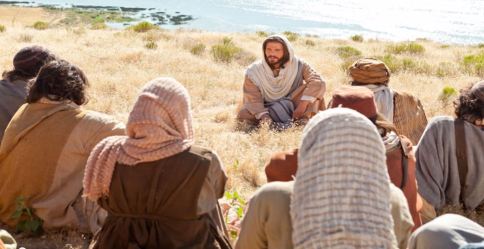
Turing our eyes from greed and love of the world we can experience true freedom. Anxiety is stirred within us as we crave such temporal things. Oddly once gained they lose their luster and another temporal desire must fill its place – if not one’s pleasure in the eternal and spiritual things God has in store for us. Indeed, worry of such things gets us nowhere.
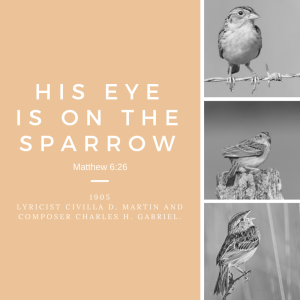
Jesus reminds us that God the Father is our provider and always watching out for us and there is no need to worry, fear, or become anxious. The lyrics in the classic gospel song “His eye is on the sparrow” (listen) remind of the same. These emotions emerge from our lack of trust and faith in God and they are often accompanied with thoughts of our own capacity – too high and haughty or broken and fragile. Jesus lesson for these apostles, disciples and us today is to keep our perspective and priorities in line. Forgetting such will undermine and derail our ministry and witness.
In the second half of this lesson Jesus also warns that we are not judge each other for this too will become a burden and cause anxiety in every relationship. Rather we ought to attend to our own sins and transgressions by setting them aside, abiding in Christ, and forgiving every transgression before it takes hold of our lives in the form of bitterness, fear, anger or timidity.
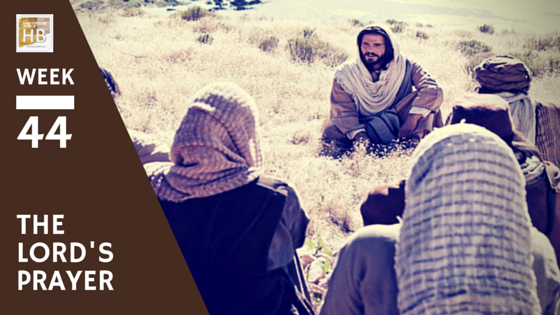
Week 44 | Section 54f
In the fourth message within the Sermon on the Mount we read from Section 54f in the ‘Harmony of the Gospels’ by Thomas and Gundry. In this section (Matthew 6:1-18) Jesus teaches the disciples and apostles gathered ‘how’ to give, forgive, fast and pray without hypocrisy.
History and archaeological records highlights the rapid spread of the Lord’s Prayer throughout Israel, to Italy, Africa, and even into Syria by the middle of the second century. By the fourth century some integrated the original form of prayer granted us by Jesus teaching, to a poetic prayer that could be said by the masses in unison. After nearly 1500 years some today recite the Lord’s prayer without understanding the meaning and truth within its words and form.
We pray that this study will invigorate your own prayer life and help you prepare to provide this teaching to those you are discipling.
May we become the fragrance of Christ, and ambassadors of the King of kings.

Week 43 | Section 54e
 God is love, God accepts us as we are, God’s grace is sufficient to blot out all our sins, and yet in the third section of the “sermon on the mount” Jesus raises the bar on righteousness and gets to the heart of the matter – our attitude and intention. The roots of sin are of equal concern as the actions which they produce and of greater importance still is the signs of grace and truth at work in and through us.
God is love, God accepts us as we are, God’s grace is sufficient to blot out all our sins, and yet in the third section of the “sermon on the mount” Jesus raises the bar on righteousness and gets to the heart of the matter – our attitude and intention. The roots of sin are of equal concern as the actions which they produce and of greater importance still is the signs of grace and truth at work in and through us.
Scriptures:
Matthew 5:21-48
21 “You have heard that it was said1¯2 to the ancient ones, ‘You shall not murder;’3 and ‘Whoever shall murder shall be in danger of the judgment.’ 22 But I tell you, that everyone who is angry with his brother without a cause shall be in danger of the judgment; and whoever shall say to his brother, ‘Raca!’4 shall be in danger of the council; and whoever shall say, ‘You fool!’ shall be in danger of the fire of Gehenna.5¯6 23 “If therefore you are offering your gift at the altar, and there remember that your brother has anything against you, 24 leave your gift there before the altar, and go your way. First be reconciled to your brother, and then come and offer your gift. 25 Agree with your adversary quickly,7 while you are with him in the way; lest perhaps the prosecutor deliver you to the judge, and the judge deliver you to the officer, and you be cast into prison. 26 Most certainly I tell you, you shall by no means get out of there, until you have paid the last penny. 27 “You have heard that it was said, ‘You shall not commit adultery;’8 28 but I tell you that everyone who gazes at a woman to lust after her has committed adultery with her already in his heart.9 29 If your right eye causes you to stumble, pluck it out and throw it away from you. For it is more profitable for you that one of your members should perish, than for your whole body to be cast into Gehenna. 30 If your right hand causes you to stumble, cut it off, and throw it away from you. For it is more profitable for you that one of your members should perish, than for your whole body to be cast into Gehenna.10 31 “It was also said, ‘Whoever shall put away his wife, let him give her a writing of divorce,’ 32 but I tell you that whoever puts away his wife, except for the cause of sexual immorality, makes her an adulteress; and whoever marries her when she is put away commits adultery. 33 “Again you have heard that it was said to them of old time, ‘You shall not make false vows, but shall perform to the Lord your vows,’11 34 but I tell you, don’t swear at all: neither by heaven, for it is the throne of God; 35 nor by the earth, for it is the footstool of his feet; nor by Jerusalem, for it is the city of the great King. 36 Neither shall you swear by your head, for you can’t make one hair white or black. 37 But let your ‘Yes’ be ‘Yes’ and your ‘No’ be ‘No.’ Whatever is more than these is of the evil one. 38 “You have heard that it was said, ‘An eye for an eye, and a tooth for a tooth.’12 39 But I tell you, don’t resist him who is evil; but whoever strikes you on your right cheek, turn to him the other also. 40 If anyone sues you to take away your coat, let him have your cloak also. 41 Whoever compels you to go one mile, go with him two. 42 Give to him who asks you, and don’t turn away him who desires to borrow from you.
[one_half last=”no”]43 “You have heard that it was said, ‘You shall love your neighbor, and hate your enemy.’ 44 But I tell you, love your enemies, bless those who curse you, do good to those who hate you, and pray for those who mistreat you and persecute you, 45 that you may be children of your Father who is in heaven. For he makes his sun to rise on the evil and the good, and sends rain on the just and the unjust. 46 For if you love those who love you, what reward do you have? Don’t even the tax collectors do the same? 47 If you only greet your friends, what more do you do than others? Don’t even the tax collectors do the same?
48 Therefore you shall be perfect, just as your Father in heaven is perfect.
[/one_half]
[one_half last=”yes”]Luke 6:27-30, 32-36
27 “But I tell you who hear: love your enemies, do good to those who hate you, 28 bless those who curse you, and pray for those who mistreat you. 29 To him who strikes you on the cheek, offer also the other; and from him who takes away your cloak, don’t withhold your coat also. 30 Give to everyone who asks you, and don’t ask him who takes away your goods to give them back again.
32 If you love those who love you, what credit is that to you? For even sinners love those who love them. 33 If you do good to those who do good to you, what credit is that to you? For even sinners do the same. 34 If you lend to those from whom you hope to receive, what credit is that to you? Even sinners lend to sinners, to receive back as much. 35 But love your enemies, and do good, and lend, expecting nothing back; and your reward will be great, and you will be children of the Most High; for he is kind toward the unthankful and evil.13 36 “Therefore be merciful, even as your Father is also merciful.[/one_half]
Group Dialog:
Learning Objectives: cleave to the righteousness of Christ and His finished work on the cross, be renewing your mind, abandon all forms of sin, hell, justification, integrity, holiness, forgiveness, sanctification, character. mercy, love.
Image: The bleeding heart (dicentra spectabilis), they are a lovely flower. Here are a few gardening tips. Its a perfect image conveying the importance of the attitude and condition of our heart, not just the appearance of our outward actions and words from our lips.
Study Notes:

Week 42 | Section 54cd
Let me tell you why you are here. You’re here to be salt-seasoning that brings out the God-flavors of this earth. You’re here to be light, bringing out the God-colors in the world. God is not a secret to be kept. We’re going public with this, as public as a city on a hill. – Jesus, The Message, Mt 5:13a,14a
Remembering that this is the inaugural message to the new anointed apostles helps us understand the importance of this message and the pattern identified below. What good would it be if Jesus apostles were considered hypocrites? What good would it do the world if they secluded themselves and meditated among themselves in solitude the wisdom of God. No the apostles and today’s disciples must allow the transforming power of God to work in and through them.
In the second lesson recorded in what’s been called the Sermon on the Mount, Jesus continues to explain to the newly appointed apostles their calling and concern. It is in this second message we see an explicit pattern in his sermon series of form and then function. In this pattern Jesus expresses the importance of ones being and doing. The transformational sequence is outlined below and will guide this section of our study through the Harmony of the Gospels.
| Section Title | Section # | Scriptures | Form/Function |
|---|---|---|---|
| Beatitudes | Sec 54 a,b | Mt 5:3-12; Lk 6:20-26 | Being |
| Salt & Light | Sec 54 c,d | Mt 5:13-16; Mt 5:17-20 | Doing |
| You’ve heard it said | Sec 54 e | Mt 5:21-48; Lk 6:27-30,32-36 | Being |
| Acts of righteousness | Sec 54 f | Mt 6:1-18 | Doing |
| Three prohibitions | Sec 54 g | Mt 6:19-7:6 | Being |
| Conclusion | Sec 54 h | Mt 7:7-27; Lk 6:31, 43-49 | Being & Doing |
Week 37 | Section 50 | Phase 4
Summary: On the way from Jerusalem to Galilee, a few Pharisees scrutinize Jesus’ disciples for gathering a bit of grain from a roadside field to quiet their stomachs. Jesus’ response is no easier for them to stomach and His final words were as meaty as the grains themselves.
Harmony Bible Radio Archive: https://soundcloud.com/gtroxell/sets/harmony-bible
Today’s Gospel Reading
| Matthew 12:1-8 | Mark 2: 23-28 | Luke 6:1-5 | John |
| 1 At that time, Jesus went on the Sabbath[i] day through the grain fields. His disciples were hungry and began to pluck heads of grain and to eat[ii]. 2 But the Pharisees, when they saw it, said to him, “Behold, your disciples do what is not lawful to do on the Sabbath[iii].” 3But he said to them, “Haven’t you read what David did[iv], when he was hungry, and those who were with him; 4 how he entered into God’s house, and ate the show bread, which was not lawful for him to eat, neither for those who were with him, but only for the priests? 5 Or have you not read in the law, that on the Sabbath day, the priests in the temple profane the Sabbath[v], and are guiltless? 6 But I tell you that one greater than the temple is here[vi]. 7 But if you had known what this means, ‘I desire mercy, and not sacrifice,’[vii] you wouldn’t have condemned the guiltless. 8 For the Son of Man is Lord of the Sabbath.”[viii] |
23 He was going on the Sabbath day through the grain fields, and his disciples began, as they went, to pluck the ears of grain. 24 The Pharisees said to him, “Behold, why do they do that which is not lawful on the Sabbath day?”
25He said to them, “Did you never read what David did, when he had need, and was hungry—he, and those who were with him? 26 How he entered into God’s house at the time of Abiathar the high priest, and ate the show bread, which is not lawful to eat except for the priests, and gave also to those who were with him?” 27 He said to them, “The Sabbath was made for man, not man for the Sabbath. 28 Therefore the Son of Man is lord even of the Sabbath.” |
1 Now on the second Sabbath after the first, he was going through the grain fields. His disciples plucked the heads of grain and ate, rubbing them in their hands.2 But some of the Pharisees said to them, “Why do you do that which is not lawful to do on the Sabbath day?”
3 Jesus, answering them, said, “Haven’t you read what David did when he was hungry, he, and those who were with him; 4 how he entered into God’s house, and took and ate the show bread, and gave also to those who were with him, which is not lawful to eat except for the priests alone?” 5 He said to them, “The Son of Man is lord of the Sabbath.” |
No record provided |
The World English Bible (WEB) is a Public Domain (no copyright) Modern English translation of the Holy Bible. That means that you may freely copy it in any form, including electronic and print formats. The World English Bible is based on the American Standard Version
Media:
Small group dialog:
Study Notes and Cross-References:
[i] This would be the Sabbath after the Passover. See Luke 6:1 that is the second Sabbath after the Feast of Unleavened Bread as the “first Sabbath” fell during the actual week of the Passover feast. There are laws and customs on the Sabbath but paramount is only this, “Remember the Sabbath and keep it Holy” (Exodus 20:8). The word holy means “to sanctify, to separate from the world and to consecrate or dedicate to God.” To be “holy” is to be separate from the world and to be dedicated to God. You might like to read this article, and also these passages: Dt 5:12-14; Exodus 31:13-17; Ezekiel 20:12,20.
[ii] It was lawful to pick grain from another’s field if hungry, however one could not fill their jar or basket – just enough to quell the hunger (Dt. 23:25). Edersheim reveals a passage from the Talmud (Jer. Shabat 10a) that indicates that picking, rubbing and eating of the grain would have been seen as three distinct sins according to Pharisaic interpretation of what God meant when He said keep the Sabbath holy. Note: that while some translations say corn, others say wheat or barley. The agricultural record would lead us to believe that it was barely, but the Levitical law would lead us to say it was wheat (Lev. 23:10) – but it really doesn’t matter – it was grain and Jesus makes point to clarify that they had not sinned.
[iii] The issue here was not picking grain but that it was a Sabbath. Mishna Shabat 7.2 states that there are 39 different categories of work prohibited on Shabat. Jesus however overrides this law claiming himself to be “Lord of the Sabbath” See also Section 49b (Specifically John 5:17) which precedes this passage by just a few days.
[iv] 1 Samuel 21:1-6 – This would have been the tabernacle as the temple was not yet built (Ex 26). You might also notice that it was Ahimelech, who served as High Priest, and allowed David to eat the consecrated bread (I Samuel 21:1-9). However, it was also during the days of Abiathar as he succeeded his father (I Samuel 22:9-20; 30:7). The event with the showbread occurred during the life of Abiathar who was a High Priest — it just didn’t happen while he was High Priest. Therefore it would have been acceptable for Jesus to mention either Abiathar or Ahimalech. See also Ex 25:30; Lev 24:5-9
[v] Just as it is today, the Sabbath was the busiest day in the week for the priests. Services and sacrifices involved all sorts of preparation: from baking the showbread; trimming wicks, sacrifices (Numbers 28:9) (killing, skinning, and cleaning of the animals, as well as building a fire). The priests were not actually sinning or profaning the Sabbath but Jesus was using the parallel to help the Pharisees gain better perspective that some work was acceptable for those doing God’s work – even on the Sabbath. Let’s remember that these customs (laws) to which they were they were referring were not the Ten Commandments, but priests refinements of them in an effort to help people remain holy, set apart, and ready to do the work of God. The fourth commandment did not forbid work on the Sabbath, but “labor for worldly gain”.
[vi] He is here continuing to compare the service within the temple and the service of his disciples to himself, alluding but for a moment to his divinity until his closing line in verse Mt 12:8; Mk 8:28; Luke 6:5.
[vii] One again Jesus quotes Hosea 6:6. Here is one of the primary spiritual lessons Jesus chose to deliver to the Pharisees and us today. The meaning is that the inward life/condition is over/supersedes the outward form. If the heart attitude or condition is wrong/sinful then outward appearance and action is far less significant/important. David said something similar in Psalm 51:16-17 and the Apostle Paul spoke of the same meaning in 1 Corinthians 13:3.
[viii] To claim himself to be “Lord of the Sabbath” and “Son of Man” (Mt 12:8; Mk 8:28; Luke 6:5) is a claim to his divinity, equality with God and role as Messiah (Dan 7:13).
Jesus Delivers a Firm Response
Week 36 | Section 49c | Phase 4
Summary: In Jesus’ longest recorded discourse yet, John shares Jesus’ response that cuts to the quick about his identity, mission and the means of salvation. Listeners today would hear His words pierce our vanity, encourage our hearts, and dispel our guilt.
Harmony Bible Radio Archive: https://soundcloud.com/gtroxell/sets/harmony-bible
Today’s Gospel Reading
(There is no record from Matthew, Mark or Luke)
| John 5:19-47 |
| 19 Jesus therefore answered them, “Most certainly, I tell you, the Son can do nothing of himself[a], but what he sees the Father doing. For whatever things he does, these the Son also does likewise. 20 For the Father has affection for the Son, and shows him all things that he himself does. He will show him greater works than these[b], that you may marvel. 21 For as the Father raises the dead and gives them life, even so the Son also gives life to whom he desires[c]. 22 For the Father judges no one, but he has given all judgment to the Son[d],23 that all may honor the Son, even as they honor the Father. He who doesn’t honor the Son doesn’t honor the Father who sent him[e]. 24 “Most certainly I tell you, he who hears my word, and believes him who sent me, has eternal life[f], and doesn’t come into judgment, but has passed out of death into life.25 Most certainly, I tell you, the hour comes, and now is, when the dead will hear the Son of God’s voice; and those who hear will live[g]. 26 For as the Father has life in himself, even so he gave to the Son also to have life in himself[h]. 27 He also gave him authority to execute judgment, because he is a son of man[i]. 28 Don’t marvel at this, for the hour comes, in which all that are in the tombs will hear his voice, 29 and will come out; those who have done good, to the resurrection of life; and those who have done evil, to the resurrection of judgment. 30 I can of myself do nothing[j]. As I hear, I judge, and my judgment is righteous; because I don’t seek my own will, but the will of my Father who sent me. 31 “If I testify about myself, my witness is not valid[k]. 32 It is another who testifies about me. I know that the testimony which he testifies about me is true. 33 You have sent to John[l], and he has testified to the truth.34 But the testimony which I receive is not from man. However, I say these things that you may be saved[m]. 35 He was the burning and shining lamp, and you were willing to rejoice for a while in his light[n].36 But the testimony which I have is greater than that of John, for the works which the Father gave me to accomplish, the very works that I do, testify about me, that the Father has sent me.37 The Father himself, who sent me, has testified about me. You have neither heard his voice at any time, nor seen his form. 38 You don’t have his word living in you; because you don’t believe him whom he sent. 39 “You search the Scriptures, because you think that in them you have eternal life; and these are they which testify about me. 40 Yet you will not come to me, that you may have life[o]. 41 I don’t receive glory from men. 42 But I know you, that you don’t have God’s love in yourselves[p]. 43 I have come in my Father’s name, and you don’t receive me[q]. If another comes in his own name, you will receive him. 44 How can you believe, who receive glory from one another, and you don’t seek the glory that comes from the only God? 45 “Don’t think that I will accuse you to the Father. There is one who accuses you, even Moses[r], on whom you have set your hope. 46 For if you believed Moses, you would believe me; for he wrote about me. 47 But if you don’t believe his writings, how will you believe my words?[s]” |
Media
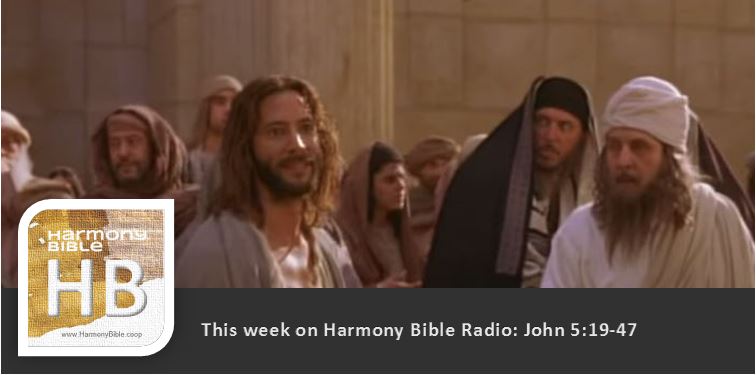 Click here to watch this clip on Youtube
Click here to watch this clip on Youtube
Audio Bible
![]()
Study Notes and Cross-References:
[a] Only what his father does – Nothing contrary to the Will of God but cooperating with Him and for the eternal purpose of unity by providing redemption and reconciliation. See John 1:1-18; John 3:16; John 14:24
[b] His Jewish audience would be filled with awe at the creation, redeeming of Israel out of Egypt, leading them through the wilderness, bringing them to the land of Canaan; the law, statutes, and ordinances of God – the working of miracles — soon via the Son of God greater things would happen, namely, assurance of redemption and justification by his righteousness, pardon of sins through his blood, and regeneration by the Holy Spirit; and grace through their journey even after conversion.
[c] Life given – perhaps a direct reference to the centurion’s daughter, the paralytic man healed and this one who laid sick – but also spiritually as He is “the resurrection and the life” (John 11:25; HBR-118b) Remember also in week 2 of our study we read of Jesus role in creation (John 1:1-18) and in section 32, 33 we read heard Johns testimony about Jesus as the Word of Life, who gives life.
[d] Judgment – The Jews had an officer in their Sanhedrim, whom they called Ab Beth Din, or “the father of the house of judgment”, who was responsible for moderating of causes brought to him, and of judging and determining them. Compare Song of Solomon 7:4, with Hebrews 1:3; 4:14-16; 8:1-5; 9:11-28; 10:19-22; and then Dan 7:9-27; 8:13,14; 9:24-27; and then Rev 14:6,7; 20:12; 14:12; 22:12.
[e] Honor – Universally it is true that one sent by the authority another regards should be equally honored. Yet tis is difficult if the listener rejected his equality with God, passages such as Isaiah 42:8 and 48:11 prohibited elevating another though when the “Lord God is One” and therefore not another (Phil 2:10-11/Isa 45:23)
[f] The key to salvation – Grace. Yet do not use grace as an excuse to continue in your sin. John 14:15, 23
[g] The means an internal hearing so as to understand it spiritually let it take root and generate a harvest. Salvation is not the goal but a means of testimony of the eternal life God has in store for all humanity reconciled to him by the Son. Hearing, receiving, believing, acting in accordance with God.
[h] From a Jewish perspective it’s God who breathes life into people. Thus there is no other way but by Jesus: I am the way the truth and the life (john 14:6)
[i] Son of man is spoken of in Old Testament prophecy (Daniel 7:13) it is a term that refers to the Messiah, one who was “not a mere man, but the man God’s fellow” (Gill); unique yet equivalent in every way.
[j] See note (a)
[k] Testimony – Among the Jewish people no man was allowed to be his own witness, nor was anything validated by a single witness but by two or three (Deuteronomy 19:15). Yet Jesus did not need this as he was equal to God.
[l] That is John the Baptist to whom the Sanhedrim, who regarded him and his words, sent a deputation of priests a little more than a year prior to determine whether he was the Messiah, or Elias, or that prophet (John 1:21). His response was one they would recall: I am not HE yet he comes (read John 1:19-28) (Read Gill’s notes on this)
[m] Justified behavior – John 3:16-19; 12:46-49
[n] They received for a while the good news of John the Baptist that the messiah was coming, but they could not receive its message (that they were sinful and in need of redemption). Deut 18:15 urged them to listen to the one sent to announce the coming of the Messiah.
[o] There are many today too who lean on understanding and knowledge not faith. The OT points to the Messiah – the need for the redeemer. If you live your whole life as a good person trusting Karma will take care of you, but it takes just one darma for you to end up worm.
[p] See again John 14:15, 23. Zech 3:8-10 was one of many OT prophetic passages. See also: 324 Messianic prophesies fulfilled by Jesus
[q] One way – John 14:6
[r] That is the Law delivered by Moses – those who have set their hope for redemption on obedience to the law (vs 16) vs the grace of God through Jesus Christ will feel themselves heavily burdened by such a weight – especially when even our righteousness is but filthy rags compared to the Glory of God (Isa 64:6; Luke 16:15; Romans 10:9-10; Gal 5:4-5).
[s] Except that mercy leads us to grace even before we receive it. Then why evangelize (other than the great commission) is that their
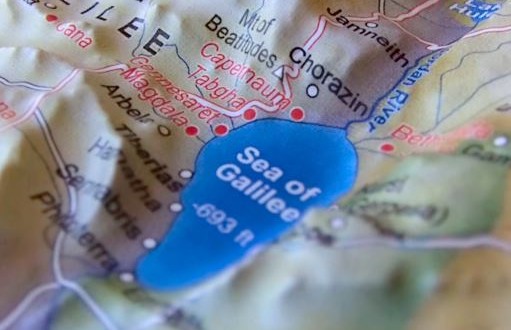
We provide a link to A.P. Stout’s classic map featuring the Journey and Deeds of Jesus, however many groups find that seeing a relief map of the holy land helps them understand the terrain and journey even better. I thought you all might enjoy seeing a gallery of photos from I took using my Lytro camera.

The relief map itself is plastic mounted on cardboard and roughly 9-inches by 14-inches. It shows the territories, major cities, the roads that existed in Jesus’ time and a vivid representation of the terrain. It really helps people get a feel of the Jordan Valley, the terrain from Capernaum to Jerusalem and onto Nazareth. The central ridge in the hill country of Judea and Sumaria, the valleys and ridges around Galilee and the rivers.
We recommend that you purchase a map for your small group online (the price is currently $29.95 + shipping).

Week 35 | Section 49a,b | Phase 4
Summary: Today’s study demonstrates the mercy of God through Jesus’s healing of a man lying beside the pool of Bethesda. The man who had been sick for thirty-eight years became well in an instant. In his response to the Jewish elders who questioned his labor on the Sabbath, Jesus gave the response that most certainly caught their attention, inasmuch as he claimed he and God the Father were equal. Now that certainly raises two most fascinating questions for today’s disciple: ‘Do you want to be well?’ and ‘Will you honor him as the Lord?’
Today’s Gospel Reading
(There is no record from Matthew, Mark or Luke)
| John 5:1-9; 10-18 |
| 1 After these things[i], there was a feast[ii] of the Jews, and Jesus went up to Jerusalem. 2 Now in Jerusalem by the sheep gate[iii], there is a pool, which is called in Hebrew, “Bethesda”[iv], having five porches. 3 In these lay a great multitude of those who were sick, blind, lame, or paralyzed, waiting for the moving of the water; 4 for an angel went down at certain times into the pool, and stirred up the water[v]. Whoever stepped in first after the stirring of the water was healed of whatever disease he had. 5 A certain man was there, who had been sick for thirty-eight years. 6 When Jesus saw him lying there, and knew[vi] that he had been sick for a long time, he asked him, “Do you want[vii] to be made well?” 7 The sick man answered him, “Sir, I have no one to put me into the pool when the water is stirred up, but while I’m coming, another steps down before me.” 8 Jesus said to him, “Arise, take up your mat, and walk.”[viii] 9 Immediately, the man was made well, and took up his mat and walked. Now it was the Sabbath on that day. 10 So the Jews said to him who was cured, “It is the Sabbath. It is not lawful for you to carry the mat.”[ix] 11 He answered them, “He who made me well, the same said to me, ‘Take up your mat, and walk.’” 12 Then they asked him, “Who is the man who said to you, ‘Take up your mat, and walk’?”[x] 13 But he who was healed didn’t know who it was, for Jesus had withdrawn, a crowd being in the place. 14 Afterward Jesus found him in the temple, and said to him, “Behold, you are made well. Sin no more, so that nothing worse happens to you.”[xi] 15 The man went away, and told the Jews that it was Jesus who had made him well. 16 For this cause the Jews persecuted Jesus, and sought to kill him, because he did these things on the Sabbath. 17 But Jesus answered them, “My Father is still working, so I am working, too.”[xii] |
[i] After this – Jesus had been in the region of Galilee and had passed through Samaria into Judea. It was back in section 32 (Week 21, Phase 2) that Jesus was last in Jerusalem for the Passover feast (John 2:23). This section marks the beginning of Phase 4. 80% of the verse of Jesus’ life and ministry have yet to be explored in the Harmony of the Gospels. Phase 4 is time of ministry development. In this time phase he will name a few of his disciples to become Apostles, overseers of the ministry. See Field Guide for ministry Discernment and Discipleship, by Greg Troxell.
[ii] This feast was probably that of Passover feast but may have been the Feast of Tabernacles (in memory of the period of wandering Lev 23:33). Either case the law obliged all the males to appear there. John does make an effort to anchor his Gospel in the context of the Passover feasts.
[iii] Sheep gate – during this time the sheep and oxen that were sold in the temple were brought through the sheep gate (Nehemiah 3:1; 3:32; 12:39).
[iv] Bethesda – As translated in the Syriac, Arabic, and Persic versions to mean a “house of mercy, grace or goodness”. Sometimes confused with Bethsaida one of two cities/towns in Galilee.
[v] Tradition has it that many were healed here. Of angels Hebrews 1:14 says, “Are they not all ministering spirits sent forth to minister for those who will inherit salvation? See other thoughts on Angels.
[vi] Foreknowledge or familiarity – The Vulgate Latin and Syriac versions specific a long time and the Arabic version says 38 years. Was it his intemperance that led to his condition? It does not say what sin but certainly some conditions are brought on by our emotional, mental and physical care or disregard.
[vii] Do you wish to be well? Jesus used this question as a manner to raise the man’s expectation of a cure. The apostle James speaks to this attitude and says “you have not because you ask not” (James 4:2-3).
[viii] At his word – again and again
[ix] Duet law –
[x] Now they were concerned not only that this man was breaking the Sabbath but that someone told him to do so.
[xi] This is a common Jewish teaching and interesting that Jesus refers to it here. What reason might there be that sin would cause such an infirmity?
[xii] My father – the father and I are one, and I am the Lord of the Sabbath (Matthew 12:8). Gk. ergázomai work. We too have our work to do and that by the aid of the Holy Spirit working through us.
Copyright©: Bible text is from the World English Bible which in public domain. Bible text is from the World English Bible which in public domain. You may download and reproduce this study guide in its entirety so long as you do not remove the footer of Harmony Bible Radio. If you would like to obtain a complimentary copy of Thomas & Gundry’s Harmony of the Gospels (NIV) in our exclusive letter-size, loose-leaf PDF, then please contact us via email or phone to schedule training.
Summary: For the first time Jesus uses a parable, a classic manner of teaching to induce further reflection and dialog. In this parable Jesus speaks of something new and old. He’s referring to the New Covenant and the Old Covenant. It was an apt moment for this lesson as John’s disciples and the Pharisees were still holding on to ‘the way things have always been done’.
Harmony Bible Radio
| Matthew 9:14-17 | Mark 2:18-22 | Luke 5:33-39 | John |
| 14 Then John’s disciplesa came to him, saying, “Why do we and the Phariseesb fast often, but your disciples don’t fast?” 15 Jesus said to themc, “Can the friends of the bridegroomd mourn, as long as the bridegroom is with them? But the days will come when the bridegroom will be taken away from them, and then they will fast.e 16 No one puts a piece of unshrunk cloth on an old garment; for the patch would tear away from the garment, and a worse hole is made. 17 fNeither do people put new wine into old wine skins, or else the skins would burst, and the wine be spilled, and the skins ruined. No, they put new wine into fresh wine skins, and both are preserved.”g | 14 Then John’s disciplesa came to him, saying, “Why do we and the Phariseesb fast often, but your disciples don’t fast?” 15 Jesus said to them,c “Can the friends of the bridegroomd mourn, as long as the bridegroom is with them? But the days will come when the bridegroom will be taken away from them, and then they will faste. 16 No one puts a piece of unshrunk cloth on an old garment; for the patch would tear away from the garment, and a worse hole is made. 17 fNeither do people put new wine into old wine skins, or else the skins would burst, and the wine be spilled, and the skins ruined. No, they put new wine into fresh wine skins, and both are preserved.”g | 33 They said to him, “Why do John’s disciplesa often fast and pray, likewise also the disciples of the Pharisees,b but yours eat and drink?” 34 He said to them,c “Can you make the friends of the bridegroomd fast, while the bridegroom is with them? 35 But the days will come when the bridegroom will be taken away from them. Then they will faste in those days.” 36 He also told a parable to them. “No one puts a piece from a new garment on an old garment, or else he will tear the new, and also the piece from the new will not match the old. 37 fNo one puts new wine into old wine skins, or else the new wine will burst the skins, and it will be spilled, and the skins will be destroyed. 38 But new wine must be put into fresh wine skins, and both are preserved. 39 No man having drunk old wine immediately desires new, for he says, ‘The old is better.’ ”g | No Record Provided |
** Our online text is from the World English Bible, rights to use this format are granted by Michael Johnson. If you would like to obtain a copy of Thomas & Gundry’s Harmony of the Gospels (NIV) in our exclusive letter-size, loose-leaf PDF, then please contact us via email or phone.
Study Notes:
a John’s disciples – strong sense of allegiance to John., an emotional connection – even though John said “I am not the one” and “there’s the messiah”.
b Pharisees – they too wanted to Law “protect and provide” but now the new covenant which gives us freedom via grace.
c At the beginning of his public common sense wisdom, then in his third year of ministry Jesus uses more prophetic wisdom from the Old Testament.
d The bridegroom is Jesus – bride is the church, the body of Christ. Paul later speaks about the husband and wife…. See: Rev. Festive nature of enjoying time with God because of Christ. Celebration. in Mt 15 the time for fasting would be an indication of the crucifixion.
e Fasting – John is currently imprisoned (see Mt 11) and so his disciples might even be grieving, and so they might be fasting to pray, and intercede, for John’s freedom (see: Matthew 17:21). The primary fast of the Jews was the Day of Atonement, one of the seven annual solemn assemblies of the Law of Moses but the Pharisees also fasted on the second and fourth days of every week, and it seems as though John’s disciples were doing something similar. It is for this reason that we don’t necessarily see that the sequence of Phase three occurs in one month as asserted by others who have created timelines. We think his tour of Galilee continued for 2-4 months.
f Transition from bridegroom to the second part of his teaching involving wine skins and the bridegroom. Ambrose makes the bridge via the fasting and the old man vs new man sanctified via Christ. (a transition – a man shall leave his mother an dfather and cleave to his wife. Genesis 2:24). 1 Corinthians 13 – love is. Paul I don’t do what I want … so Paul and we both rely on God’s grace.
g The old cloth on new garment is a reference to the New Covenant creates riffs in our thinking given the Good News, our old nature, the law, and our old world view.
Watch 2 minute clip
PLACE CODE HERE
Song: IF ANY
PLACE CODE HERE